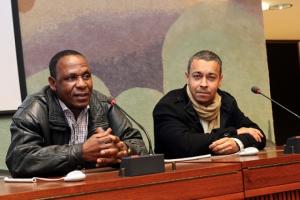Envolvimento da Comunicação Social na Promoção de Saúde
“Great progress has been made in clearing landmines across Mozambique,” says Luis Wamusse, a campaigner for the rights of landmine survivors, “but today, the focus needs to move to help persons living with disabilities as a result of mines.”
Luis, a campaigner for the rights of landmine survivors with RAVIM, is just one of thousands of Mozambicans living with disabilities caused by landmines, a harsh legacy of three separate conflicts in the country.
Mine contamination is a problem that numerous UN organizations and agencies have been working to eradicate in Mozambique. From the very early stages of the peace process to today, UNDP, UNICEF, WHO and others have worked to clear landmines, educate people about the risks they pose and assist landmine survivors with the care and support they need.
Next week, the States Parties to the Anti-Personnel Mine Ban Convention will come to Mozambique for the Maputo Review Conference on a Mine-Free World. They will be joined by numerous partner organizations, international and non-governmental, to discuss the path forward for the Convention and its goals. One of the Convention’s key areas is victim assistance.
“Our priorities at the moment are ensuring access to resources –wheelchairs, crutches and so on—as well as ensuring that people have psychosocial and vocational support,” says Luis, “Improving accessibility and information on resources and healthcare is also critical.”
The WHO is committed to increasing access to and quality of health care in Mozambique. WHO is working to strengthen the health system and human workforce to meet the needs of persons living with disabilities.
In 2012, Mozambique had 345 health professionals in the area of physical rehabilitation in the national health system . WHO and partners are supporting the Ministry of Health in ensuring that these health care workers support and protect the rights and dignity of persons with disabilities while educating them about their own health and health care needs. This includes ensuring that disabilities and injuries form an integral component of national health policies.
Globally, in line with the Convention on the Rights of Persons with Disabilities, WHO approved the “Global disability action plan 2014–2021: Better health for all people with disability”, which forms the base of support to countries including Mozambique.
In the lead-up to the Maputo Review Conference on a Mine-Free World, WHO would like to reiterate its commitment to universal health coverage.
__________________________________________________
For more information, please see:
- Maputo Review Conference on a Mine-Free World: http://www.maputoreviewconference.org/
- WHO’s work on disabilities: http://who.int/topics/disabilities/en/



